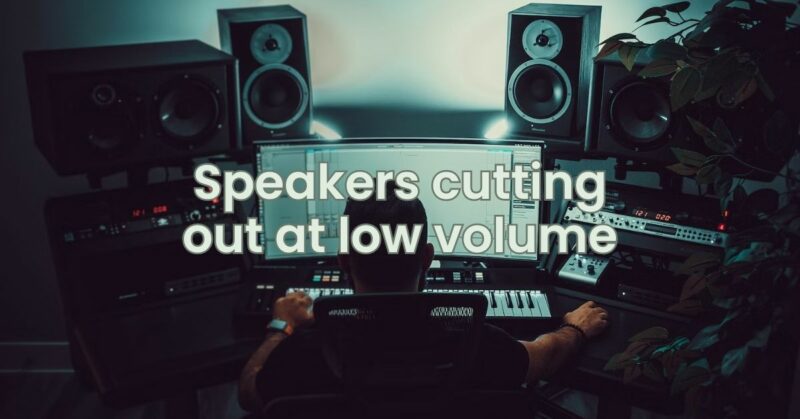While speakers are designed to deliver clear and uninterrupted sound, some users may encounter an issue where their speakers cut out or produce intermittent sound when set at low volume levels. This problem can be frustrating, especially for late-night or background listening scenarios. In this article, we will explore the potential causes behind speakers cutting out at low volume and provide a step-by-step troubleshooting guide to help you resolve the issue and restore smooth audio playback.
- Check Speaker Connections
The first step in addressing this issue is to inspect the speaker connections. Ensure that all cables and wires connecting the speakers to the amplifier or audio source are securely plugged in. Loose connections can result in sound interruptions, especially at low volume levels.
- Verify Audio Source Settings
Check the volume settings on your audio source, such as a computer, smartphone, or audio player. Some devices have power-saving features or automatic volume leveling, which can cause speakers to cut out at low volume. Adjust the volume settings to ensure they are appropriate for your listening needs.
- Examine Speaker Impedance
Speaker impedance is a critical factor in determining how speakers interact with the amplifier. If the impedance of the speakers does not match the amplifier’s output impedance, it can lead to sound issues, including cutting out at low volume. Consult the user manuals of both the speakers and the amplifier to ensure compatibility.
- Clean the Connections
Over time, dust and dirt can accumulate on the speaker connections and affect the audio signal transmission. Clean the speaker connectors and the input/output jacks on both the speakers and the amplifier to ensure a stable connection.
- Investigate the Amplifier
The amplifier may be a potential source of the problem. Inspect the amplifier for any visible damage or overheating issues. Also, check for loose or damaged internal components. If you suspect a problem with the amplifier, consult a professional audio technician for further evaluation and repair.
- Try a Different Audio Source
To rule out any issues with the audio source, try using a different device to play audio through the speakers. Sometimes, the issue may be specific to a particular audio source, and switching to another device can help pinpoint the problem.
- Test with Different Volume Levels
Pay attention to whether the speakers cut out consistently at all low volume levels or only at a particular range. If the problem occurs only within a specific volume range, it might be due to the speakers’ sensitivity to low-level audio signals.
- Update Firmware and Software
If your speakers have firmware that can be updated, check the manufacturer’s website for any available updates. Additionally, ensure that your audio source’s drivers and software are up-to-date. Outdated firmware or software can sometimes cause compatibility issues with low-volume audio playback.
Conclusion
Speakers cutting out at low volume can be a frustrating issue, but with the right troubleshooting steps, it can often be resolved. Start by checking the speaker connections and verifying the audio source settings. Examine the speaker impedance and clean the connections to ensure a stable audio signal. Investigate the amplifier for any potential problems and consider trying a different audio source. Test the speakers at different volume levels to understand if the issue is related to their sensitivity. Lastly, update firmware and software to ensure optimal compatibility. By following these steps, you can identify and address the root cause of the problem, allowing you to enjoy uninterrupted and clear audio playback at all volume levels. If the issue persists despite your efforts, consider seeking assistance from a professional audio technician for further diagnosis and repair.


